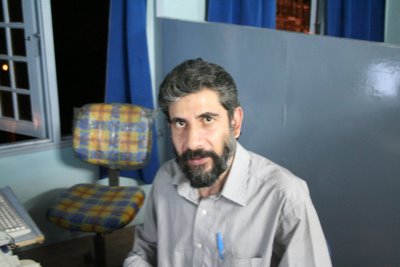 Like most of my co-workers, I first met Asif at the office. He shuffled in silently without my noticing while I was working at a computer, and then, just behind my left shoulder, said in a soft, purposeful baritone, “Hello.” I turned and took him in, a lanky man with a thick salt and pepper beard and curly, similarly streaked hair. He was wearing, as always, an ironed button-up shirt and khakis. He stood stock still with his right hand extended, just the hint of a smile on his lips, and what struck me was his presence, or lack thereof, his very lightness of being; here before me was one of Kashmir’s countless living victims, a man not fully there, a wraith, a phantom, with the shock of some great horror still in his eyes, which were wide open but emotionless, as if he were seeing the world through a dark veil and it took a Herculean effort to make out the proper images and shapes, faces, facts. With the severely weakened force of his combined energies Asif was willing himself into that office, greeting a new colleague as if everything he knew and believed in hadn’t been consigned to oblivion some sullied, long ago day. With a birthday candle breath I could blow him out of the room.
Like most of my co-workers, I first met Asif at the office. He shuffled in silently without my noticing while I was working at a computer, and then, just behind my left shoulder, said in a soft, purposeful baritone, “Hello.” I turned and took him in, a lanky man with a thick salt and pepper beard and curly, similarly streaked hair. He was wearing, as always, an ironed button-up shirt and khakis. He stood stock still with his right hand extended, just the hint of a smile on his lips, and what struck me was his presence, or lack thereof, his very lightness of being; here before me was one of Kashmir’s countless living victims, a man not fully there, a wraith, a phantom, with the shock of some great horror still in his eyes, which were wide open but emotionless, as if he were seeing the world through a dark veil and it took a Herculean effort to make out the proper images and shapes, faces, facts. With the severely weakened force of his combined energies Asif was willing himself into that office, greeting a new colleague as if everything he knew and believed in hadn’t been consigned to oblivion some sullied, long ago day. With a birthday candle breath I could blow him out of the room.“Hi,” I said, trying to sound comfortably pleasant and giving his hand a firm shake, which he returned wanly, trying at the same time to make his smile foreigner-worthy.
“Asif here is a great writer, Dave, a really great writer,” said a nearby Farooq, stressing those adjectives as only he can.
“I used to be a writer,” Asif countered sluggishly, glancing at me but focusing more on the floor.
Sajjad then pointed out that I was sitting in Asif's seat, using his computer, and I noticed that he was still at my shoulder, sort of shuffling in place unsure what to do, not wanting to make any requests on the new big shot but also desirous to get down to the business of getting lost in his work.
Which he was soon able to do, and, as I would learn over the next few weeks, which entailed sitting at that very seat to Sajjad’s left, poring over endless pages of newswires written in Urdu and translating them oh so meticulously into English while chain-smoking Gold Flake cigarettes. He rarely made a peep, except when asked by Sajjad or Hamid about some language clarification for a headline or a news story. From 5:30 until whenever the paper was done, Asif sat and worked, gripping the pages with long, slightly unsteady fingers, reading with his golfball eyes, and typing slowly, steadily, with great focus and determination.
So as is my wont I’ve been trying for weeks to bring him out of his shell, to get him talking and laughing and generally joining the living, and about a week after my arrival he had complemented a story of mine and I asked him about his writing and we came around to why he had stopped.
“I have sinned,” he intoned, trying to play it off as a joke. In truth it sounded more like a mantra than a response, and I dared not go further.
And then last week Asif and I had gotten into an amiable conversation just after he came in and again I felt like digging a little deeper.
“So why did you stop writing?” I asked, knowing I was heading down a dark corridor.
“A long time ago,” he responded, deeply, ominously. “I did something.”
“What?” I asked, hoping yet worried he might tell me. “What did you do?”
“Something very bad,” he answered, staring into me with his gentle brown eyes wide as saucers, then letting them droop slightly and turning away slowly. “Very bad.”
And so it must have been.

No comments:
Post a Comment